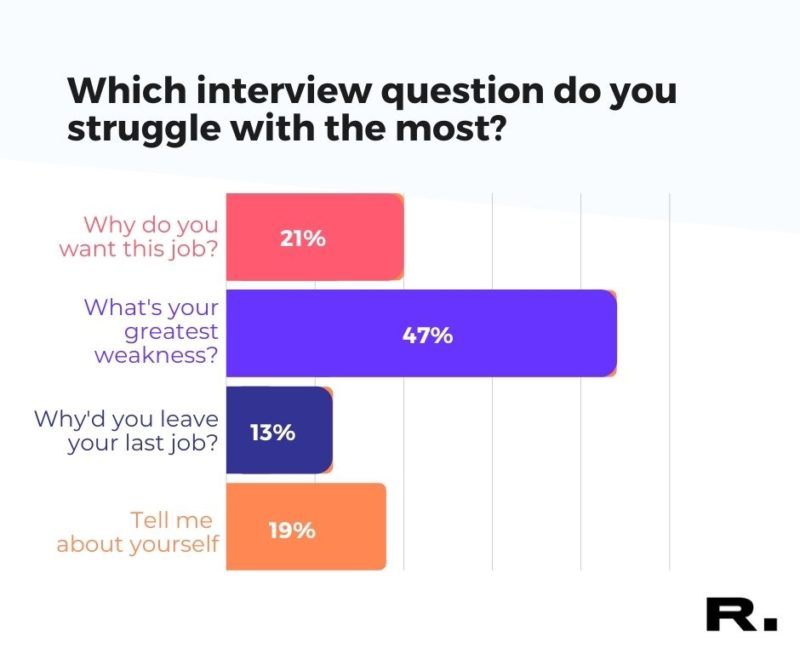Okay, so you’ve researched ahead of your interview, and are feeling confident with answering most interview questions with the STAR technique… But what about tackling the trickiest interview questions? 😱
We shared a poll on our LinkedIn back in July 2021 to find exactly which questions gave you the biggest grief during an interview, and here are the results:

So, in this article, we’ll be covering the best answers to:
- Why do you want this job?
- What is your greatest weakness?
- Why did you leave your last job?
- Do you have any questions for us?
(We’re saving “Tell me about yourself” for another blog, don’t worry!)
If any of these questions cause you to stumble, don’t fear! We’re covering examples of what you shouldn’t do, and tips on how to give the best answers to the trickiest interview questions. We’ve got your back.
Tricky interview question 1: Why do you want this job?
This question likely pops up near the start, before or after the “Tell us a bit about yourself” or “What do you know about the company?”. It may be worded slightly differently, such as “Why did you apply for this role?” or “Tell us why you want to work for us”.
Hiring managers are looking for a sense of who you really are, how you’d fit in the organisation and how you will add value.
Even if you don’t see yourself in the position for a long time, don’t specifically state this. Just show that you can see how the job makes sense for you now and allude to being future-positive.
💩 Bad answers:
- “I need a job.”
- “The salary looked good.”
- “This role is just a step for my next career move.”
👍 Excellent answers:
While there might be a bit of truth behind the bad answers, unfortunately, it’s not what the hiring manager wants to hear! They want to hire someone who will provide added value to the team and company, is willing to grow in the position, and is driven to help the company reach their goals.
Therefore, the key to this tricky interview question is to cover three areas in your answer:
- Talk about your enthusiasm and passion for the company (show off your research about what makes them appealing to you – E.g. their mission/vision statement, any new products or services, their values/ethics, their size/structure)
- Highlight how your skills suit the role currently (show how you bring value to the role currently with your industry-specific experience or knowledge)
- Answer how you will add value to the company/team/role in the long-term (show your drive, ambition, and how you are willing to learn and grow – for instance, highlighting your soft skills)
💡 Top tip:
Looking for a more precise example answer? Because a good answer to this question will involve relating them to your personal experiences, we’ve written an entire blog on just this question. Read “How to answer: why do you want this job?” here, which includes templates for you to use (where you can just fill in the relevant blanks).
Tricky interview question 2: What is your greatest weakness?
(AKA – the number one trickiest interview question, as voted for by our LinkedIn followers)
We hate this question.
Basically, to give a good answer, you need to be self-aware and honest…but not overshare. Don’t try and highlight your strengths in the form of a weakness. Definitely don’t go for flat out denial – the interviewer will read right through it.
Instead, focus on an area or soft skill that you want to grow in. Just make it clear that it’s not so severe that it will interfere with your ability to do the job.
Interviewers are looking to see that you weakness won’t hold you back. In summary: show that you have a healthy level of self-awareness, can be open and honest about your shortcomings, and that you pursue self-improvement.
💩 Bad answers:
- “My greatest weakness is that I work too hard.”
- “I don’t like teamwork.”
- “I am too much of a perfectionist.”
- “My weakness is that not very good with numbers” (Please don’t say this if you’re applying to be a data scientist…)
- “I’m blunt.”
- “I hate public speaking.”
👍 Excellent answers:
Here’s a short guide to answering this question with a couple of examples:
Poll results - tricky interview question help - greatest weakness RecruitmentJunkyPrefer full answers? Check out the below.
- “I sometimes struggle with collaboration, as I prefer to do projects by myself. It’s an area I am working on though – I’ve realised that while I think I can manage the project on my own, it’s far more effective when I work in a team.” – (Extend this with an example. For instance: “In my latest project, I really tried hard to work better within a team and not take the lead. We spread the workload and played to our strengths. This resulted in us finishing the project two weeks earlier than planned!”)
- “My biggest weakness is that I like my work to be perfect, so I sometimes take too long to complete projects. I’ve opened up about this to my manager, who has taught me to divide my work up and delegate where possible, so I can still get my work done to a high-quality and on time.”
- “I don’t have much experience with data analytics. While not directly related to my role, I believe it’s important to still understand how statistics and data can improve results. To tackle this weakness, I’ve been taking online courses in data analytics, such as Google Analytics.”
- “I’m used to being blunt and straightforward, which allows me to get things done efficiently. People appreciate it when I’m honest with them. However, my bluntness is not a strength when delivering feedback to colleagues or employees. To combat this, I have talked to friends to share how to take a softer approach and develop showing better empathy.”
Ultimately, employers want to be reassured that, despite your weaknesses, your productivity will not be in question.
Tricky interview question 3: Why did you leave your last job?
Otherwise known as “What’s something you didn’t like about your last job – but don’t be too honest!”.
No matter if you hated your last job, you never want to talk badly about a former employer (even if you’re sure it won’t get back to them). Whether your boss was a nightmare, the company was toxic, or you hated a colleague who never pulled their weight, slagging people off in an interview is a no-no. It could make you come across as unsuitable, unprofessional and not a team player.
(Or worse – the hiring manager might actually be close friends with your ex-colleague!)
💩 Bad answers:
- “My boss was a micromanager/incompetent/an idiot.”
- “I hate the company culture.” / “I’m sick of being at my current company.”
- “A recruiter approached me”
- “It doesn’t pay enough.”
- “My work is boring.”
- “I didn’t like driving to the office.”
- “I was fired.”
These are all valid reasons for moving on, but you don’t want to broadcast that. Instead, don’t point fingers of blame, and keep the focus on you and what you want for your future.
👍 Excellent answers:
- “I gained a lot of excellent experience in the industry, but I am now looking for a company where I can contribute more and grow in a team-orientated environment.”
- “I had been with the organisation for several years and wanted to experience a new environment to continue growing. I’m looking to advance my career – and as your company is industry-leading, what your offering sounds like the perfect opportunity and an ideal match for my qualifications.”
- “To be honest, I wasn’t considering a change, but a recruiter approached me. A former colleague recommended your company too, and after looking at the position and doing some research, I found myself really interested in the role!”
- “I am looking for a position with more responsibilities, where I can feel challenged and grow.”
- “I recently achieved a qualification and I want to apply my new knowledge and technical skills. I couldn’t accomplish this in my current role, but when I read the job description for this job, I thought it was the ideal match.”
- “In my last role, I was spending over an hour a day commuting to the office. I would prefer to find a job that is closer to home, and want to use my skills and experience in a different capacity.”
💡 Top tip:
Keep your response positive, but short. You can be honest – but frame it in a way that puts you in a good light!
What about if you were let go? Here are a couple of good examples you could use/tweak for your situation:
- “Sadly I was laid-off from my last role, as my job was eliminated due to downsizing and furloughing during Covid-19. I’m now actively seeking employment.”
- “I was desperate for work, and took the wrong job without doing my research. I won’t be making that mistake again! Now I know I’m looking for an environment that is structured and team-orientated, where my best talents can shine.”
Tricky interview question 4: Do you have any questions for us?
Let’s get straight into this one!
💩 Bad answers:
The biggest mistake you can make here is saying “no”. (This is probably why it’s one of the trickiest interview questions!)
If you have not prepared any questions for the interviewers, they may take this as a lack of interest from you. Plus, this is the golden opportunity to find out more about the job and company to see if it’s a perfect match for YOU.
👍 Excellent answers:
Simply put, draft a few questions beforehand! We’ve got a blog that covers LOADS of questions you can ask in an interview here. Our favourites are:
- “What do you enjoy most about working here?”
- “What’s a project you’ve worked on recently for [company] that you’re really proud of?”
- “How do you define success in this role?”
- “What is the biggest challenge your department is facing today?”
- “Is there anything about my experience that makes you question whether I am a good fit for this role?”
There are plenty of questions interviewers could ask you, but these are the classics that nearly always appear.
Get swotting up on these, practice your answers, and you’ll be acing your next interview!
Other Reads

10 Minute Read 26.07.21
How to answer "Why do you want this job?"
“Why do you want this job?” Oh boy, what a minefield of a question. 😟 Let’s bre...

3 Minute Read 08.12.20
How to answer job interview questions effectively using STAR
Found yourself out of work for the first time in a long time? We’ve launched the #GetHired Skills ...

2 Minute Read 08.12.20
How to follow up after a job interview
Writing a brief follow up after a job interview can be a good way to reaffirm positive feelings, sha...